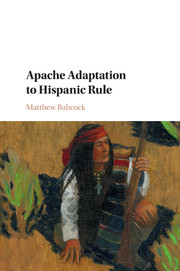2 - Precedents
Published online by Cambridge University Press: 05 September 2016
Summary
In July 1779, a delegation of Mescalero allies met with Commander-in-Chief of the Interior Provinces of New Spain, Teodoro de Croix, in Chihuahua. Seeking protection from their Lipan and Comanche enemies and from Coahuila Governor Juan de Ugalde's warring troops, these Indians petitioned Croix to establish “pueblos formales,” or formal towns, for their people at the former mission site of La Junta de los Rios, at the confluence of the Conchos and Rio Grande, near Presidio del Norte in northern Nueva Vizcaya (modern Ojinaga, across the river from Presidio, Texas). Farther north, other Apache groups joined the Mescaleros near presidios along the Rio Grande Valley. The headman Bigotes’ Mescalero band from the Pecos River, whom Spaniards called Salineros, solicited peace in July and settled at San Elizario and Nantan Chafalote's Chihene band, whom Spaniards called Chafalotes, settled at El Paso.
The Spanish military, under Croix's leadership, had just succeeded in establishing the first system of garrisoned agricultural communities for Apaches that did not involve missionaries. Croix clearly recognized the birth of a new system, for beginning in May 1780 he delineated an important new subheading within his monthly reports on Indian activities: “Recent news occurred with the Mescaleros de paz [‘peaceful Mescaleros’], and state of the new establecimientos [‘establishments’ or ‘settlements’] in Nueva Vizcaya.” Croix's pueblos are significant because they served as the most immediate precedent for the Spanish military's larger system of garrisoned Apache reservations and ungarrisoned Comanche and Navajo pueblos in the late 1780s.
This chapter explores the local, regional, and global factors that influenced the creation of Apache reservations by viewing Spanish efforts to incorporate Apaches through Teodoro de Croix's eyes and using the most enduring of his establecimientos – the Mescalero pueblos at La Junta – as a case study. A French native and career Spanish officer, Croix had risen from ensign to captain during a twenty-year European tour in Italy and Flanders. After accompanying his uncle, the Marqués de Croix, to New Spain in 1766, Croix served an additional five years at the rank of brigadier, during his uncle's tenure as viceroy. Croix was a close student of Spanish–Indian relations on the northern frontier.
- Type
- Chapter
- Information
- Apache Adaptation to Hispanic Rule , pp. 61 - 104Publisher: Cambridge University PressPrint publication year: 2016



